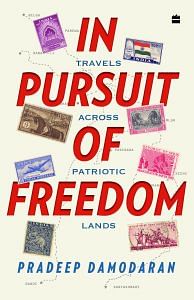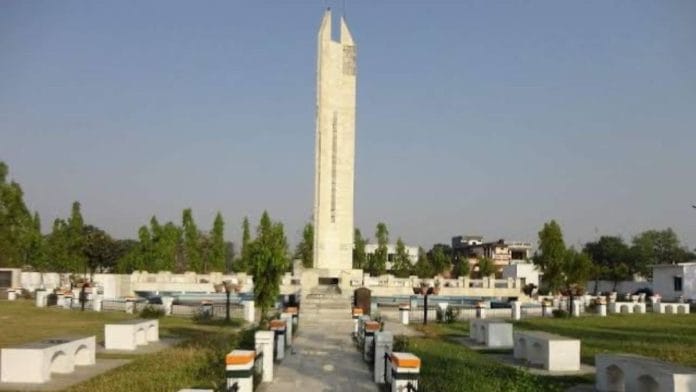About 2 kilometres from Chauri Chaura Railway Station is Mehiyan village, where Ram Narayan Tripathi lives with his children and grandchildren in their modest one-storey home with cement flooring, plastered but unpainted walls and windows with broken, stained-glass panes. He is eighty-two, mostly bedridden and dependant on his walking stick and grandson Suryansh, even to go to the toilet behind their living room.
Ram Narayan’s grandfather Lal Behari, a.k.a. Meghu Tiwari, was hanged by the British government in 1923 for his role in the Chauri Chaura violence when he was just thirty-seven. Hailing from an influential family with substantial wealth at the time of the riots, Ram Narayan’s parents and grandparents suffered the brunt of the British brutality and were stripped of all their wealth in the years following the Chauri Chaura violence.
More than a hundred years later, Ram Narayan, his children and his grandchildren barely manage a middle-class life. Until health began to fail him, Mr Tripathi had been the voice of the Senani families of Chauri Chaura for several decades, a role that Mahant of Lakshmi Mobile Care has now taken over from him. When I called Ram Narayan and asked if I could meet him at his residence, he immediately agreed and provided directions through his son, Ravi Narayan Tripathi. ‘I will also try to bring other families of freedom fighters,’ he suggested.
Upon reaching his home, I found two other men, also grandchildren of freedom fighters, sitting around Ram Narayan’s cot in the living room, where he was lying on his back. His son, Ravi Narayan, and eldest grandson, Suryansh, were also present in the living room with us, listening to him speak about the legacy they had inherited. After sitting upright with the help of Suryansh, Ram Narayan introduced the other Senani kin, whose grandfathers hadn’t been hanged but had served prison time and later died of natural causes.
While most of the Senani kin remain largely illiterate and spent their lives working on their farms or as casual labourers, Ram Narayan began his career as a teacher, and later got a law degree and practised as an advocate for most of his adult life. ‘Even now, I do go to the court rarely,’ he uttered in clear English when I asked about his occupation. Due to his qualification and family background, he became the unofficial spokesperson of the freedom fighters’ families in his younger years, a role he performed well.
Also read: Habib Tanvir’s Charandas Chor was led by Dalit actors from Chhattisgarh—and they owned the play
‘Basically, there is only one thing to say about our freedom fighter families,’ he declared. ‘Except one or two, most of us are living hand to mouth. This is the truth of the Chauri Chaura freedom fighters’ families.’
While his grandfather had died much before Ram Narayan was born, he had heard from his parents that Meghu Tiwari was one of the prominent residents of Mehiyan and owned farmlands both in Mehiyan as well as in Pahalganj. The family also owned a textile business at Mundera Bazar until the police station attack took place.
‘After the incident, they took away everything. My grandfather and his relatives were harassed and looted of all their wealth. We all know what would happen to those who set fire to a police station and kill nineteen policemen now in 2022. Imagine how brutal the British reaction to the incident was when someone killed their officers and men in 1922! None of the families of those involved in the riots were spared of anything; even our cattle weren’t spared,’ he explained, as the other men around him nodded in agreement with every detail.
‘My father, Rambali Tiwari, had to literally start from scratch again, and what you see now is what we built since then. Everything we had until that point was wiped out.’
While the family had been relieved of its wealth, the adulation and respect they received from the villagers and even the government has never been in short supply. When Ram Narayan was an active lawyer, he got an opportunity in 1978 to be a part of the inner security personnel of the late Prime Minister Indira Gandhi during her visit to Gorakhpur.
‘When I got an opportunity, I told her about my grandfather and the Chauri Chaura incident and how there is not even a memorial to commemorate their sacrifice, while the dead policemen have a memorial. Ms Gandhi had come to campaign for a bypoll and assured me that she’ll do something about it if they win. The Congress won and sure enough, money was sanctioned for a memorial,’ he recalled.
Since then, Ram Narayan has stayed in constant touch with the bureaucracy and Congress leaders in New Delhi. To prove his proximity to top national leaders, Ram Narayan also pulled out black-and-white photographs with some of the leaders and showed them to me.
While getting a memorial in Chauri Chaura turned out to be relatively easy, getting recognition as freedom fighters’ families, who were thus eligible for pension, turned out to be a more cumbersome affair and took some more years. Only in 1993 were the families of those who were hanged for the Chauri Chaura violence entitled to freedom fighters’ family pension.
‘The P.V. Narasimha Rao government finally recognized our families as freedom fighters’ descendants and granted the direct descendants family pension. What started as a modest sum of around Rs 800 or so has now increased to Rs 20,000, but we still face discrimination when compared with other freedom fighter families and I wonder why,’ he said.
Ram Narayan had two sons, one of whom passed away some time ago. His surviving son, Ravi Narayan Tripathi, now works at the Chauri Chaura Memorial Library for a salary of Rs 8,000 per month, which he receives from the Mundera Bazar (Town Area) local body, his employer. The family also owns some agricultural land, from which he gets some additional income.
While Ram Narayan sounded hopeless and dejected, his forty-three-year-old son intervened and said that they were proud of their inheritance. ‘We might not have a lot of money and the government might not recognize what my great-grandfather sacrificed. But we are proud of what they did and the villagers respect us for it. The recognition we get from society is enough. If we go about seeking alms, our ancestors’ sacrifices will become meaningless,’ he asserted.
 This excerpt from Pradeep Damodaran’s book, ‘In Pursuit of Freedom: Travels Across Patriotic Lands’, has been published with permission from HarperCollins India.
This excerpt from Pradeep Damodaran’s book, ‘In Pursuit of Freedom: Travels Across Patriotic Lands’, has been published with permission from HarperCollins India.






